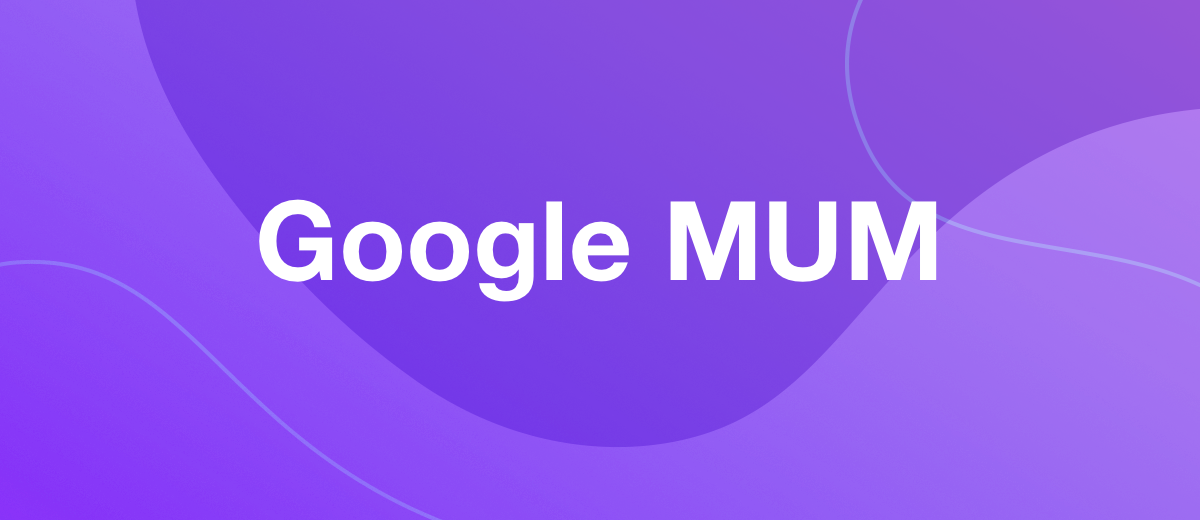SEO Optimization for Google MUM
How the emergence of a new search algorithm from Google can change the life of SEO specialists – read in our material.
Content:
1. What is known about MUM
2. Impact of Google MUM on SEO
3. The importance of media formats is increasing
4. Specific recommendations
5. Conclusion
It is quite possible that the most popular search tool on the Internet will soon switch to a new algorithm. Last year, Google announced such a transition. In this post, we’ll tell you how SEO optimization can change after MUM finally replaces the previously used search algorithms.
What is known about MUM
We will briefly describe the main features of the technology. Multitask Unified Model (MUM) is the next stage in the evolution of Google's AI-based search algorithms. For the user, the implementation of MUM means getting a more complete answer without the use of clarifying questions. The new algorithm expanded the possibilities of working with the text format. It is now capable of examining documents in 75 languages.
In addition, the search engine will be able to find the required media formats (graphics, video, audio). It seems that Google Search is turning from a search engine into a real tool for presenting knowledge.
Influence of Google MUM on SEO
Optimizers are redesigning their work every time Google Search changes the way they search for information on the web. Or, at least, expect some important changes. So it was after the advent of BERT (Bidirectional Encoder Representations from Transformers) – the algorithm that was replaced by MUM. Now we are experiencing the same experiences, but at a new round of technology.
- Automate the work of an online store or landing
- Empower through integration
- Don't spend money on programmers and integrators
- Save time by automating routine tasks
On one end of the spectrum of opinion are the pessimists who claim that “MUM will kill SEO”. The user will no longer set a query containing keywords. A person will simply communicate with the search engine, and it will figure out what to find on its own. That is, the profession of SEO-optimizer will turn into an endangered one.
On the other side of the spectrum are optimists who do not expect revolutionary upheavals. Optimists believe that techniques and strategies that have justified themselves will continue to justify themselves. Yes, something will have to be changed in routine operations. But SEO specialists will definitely not remain hungry.
Probably, the truth, as always, is somewhere between such extremes.

Media formats are growing in importance
For content creators, SEOs, marketers, website owners, there is an important aspect of MUM technology that should be immediately taken into account. While the predecessor of the “multi-tasking unified model” focused more on text content, the new technology searches all media formats. At the same time, language restrictions are removed almost completely. MUM searches for the information the user needs in 75 languages.
Yes, text content will be selected by the algorithm in the first place. But a simple text note on a blog, ceteris paribus, will lose the same, but supplemented by a photo gallery or video.
If we talk about this post, it would look perfect for MUM with a set of screenshots, a video clip on filling in the Title and Alt tag fields in photos, and a podcast with an opinion on the prospects of some SEO guru.
Specific Recommendations
Below is a list of recommendations for tailoring SEO optimization to MUM preferences. Calls to create “unique content”, write “captivating informative texts”, upload “unique images” are ignored as a matter of course.
- In the texts, describe the subject of the story in detail. Clearly explain obscure or little-known terms.
- Minimize the use of photo stocks, where it is possible. Give preference to original images.
- Once again, study Google's recommendations for filling in the title and Alt fields of images. Get out of the habit of putting just a key request there. Do not be too lazy to once again think about how to convey to the user what exactly can be found on the page.
- Don't forget about micro-markup for pages and sites.
- Much has been said above about the role of video in promoting a resource. Pay attention to microdata for videos. So there are more chances that the search engine will treat your creation favorably.
- If possible, add a Frequently Asked Questions (FAQ) block to the publication.
- Get used to paying more attention to entities. In SEO, the term means “single, unique, well-defined and distinguishable item or concept”. To give an example of an entity: there are many chefs in the world. Therefore, "chef" is not an entity. But if we are talking about Paul Bocuse, then we are dealing with an entity - a single, unique character. Google Search uses entities to learn the meaning of content and thus reduces the role of keywords and links in rankings. The explanation of the term “entity” and its role in optimization cannot be stated in one paragraph. The topic deserves a separate text. Pay attention to the following. By and large, the application just made will please MUM – in the form of an attempt to explain the concept of essence.
- When optimizing, pay more attention to issues related to the field of EAT (Expertise, Authoritativeness, Trustworthiness).
Conclusion
Judging by the reaction of the SEO community, the appearance of MUM in the Google search engine will not cause a radical change in their daily work. Yes, you will have to force yourself not to be lazy in observing some rules. Or understand previously uninteresting or unclaimed topics. But still, the main criterion for success will remain high-quality, unique content.
Apix-Drive is a simple and efficient system connector that will help you automate routine tasks and optimize business processes. You can save time and money, direct these resources to more important purposes. Test ApiX-Drive and make sure that this tool will relieve your employees and after 5 minutes of settings your business will start working faster.


